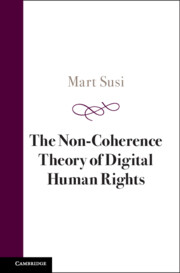Book contents
- The Non-coherence Theory of Digital Human Rights
- The Non-coherence Theory of Digital Human Rights
- Copyright page
- Contents
- Acknowledgements
- Introduction
- Part I The Contextual Challenges and Purpose of the Non-coherence Theory of Digital Human Rights
- Part II Reflections on Some Theories and Doctrines
- Part III The Core Elements of Non-coherence Theory
- 13 Doctrinal Changes in Scope and the Meaning of Human Rights
- 14 The Variance Principle and Digital Transparency
- 15 Legal Certainty and Uncertainty
- 16 On Foreseeability and Non-foreseeability
- 17 Reflections from the Academic Debate
- Part IV The Impact of the Non-coherence Theory
- Part V Internet Balancing Formula
- In Lieu of the Concluding Remarks
- Index
13 - Doctrinal Changes in Scope and the Meaning of Human Rights
from Part III - The Core Elements of Non-coherence Theory
Published online by Cambridge University Press: 22 February 2024
- The Non-coherence Theory of Digital Human Rights
- The Non-coherence Theory of Digital Human Rights
- Copyright page
- Contents
- Acknowledgements
- Introduction
- Part I The Contextual Challenges and Purpose of the Non-coherence Theory of Digital Human Rights
- Part II Reflections on Some Theories and Doctrines
- Part III The Core Elements of Non-coherence Theory
- 13 Doctrinal Changes in Scope and the Meaning of Human Rights
- 14 The Variance Principle and Digital Transparency
- 15 Legal Certainty and Uncertainty
- 16 On Foreseeability and Non-foreseeability
- 17 Reflections from the Academic Debate
- Part IV The Impact of the Non-coherence Theory
- Part V Internet Balancing Formula
- In Lieu of the Concluding Remarks
- Index
Summary
Building on the analogy from quantum mechanics, we can ask whether certain human rights exist in a shared state. This would mean, for instance, whether the right to privacy exists in a shared state with the right to freedom of expression. Or, whether the right to reputation – leaving aside the issue whether such a self-standing right can be justified – exists in a shared state with the right of access to information. If the premise of such a shared state is correct, then it would follow that change in the scope and meaning of one right (particle) in this shared state leads to a simultaneous change in the opposite direction in the other right (particle). After transposition into a new domain, the features of a human rights idea, or characteristics of some offline traditional right, may appear in a higher spectrum than in the traditional setting. We notice wide variance between the meaning of freedom of expression offline and online, since offline it can rarely be justified as an absolute right, whereas online practice shows a duality: the parallel possibility of relativity and absoluteness.
Keywords
- Type
- Chapter
- Information
- The Non-Coherence Theory of Digital Human Rights , pp. 135 - 164Publisher: Cambridge University PressPrint publication year: 2024

